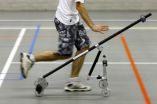(Press-News.org) Chlorine is an abundant and readily available halogen gas commonly associated with the sanitation of swimming pools and drinking water. Could a one-atom thick sheet of this element revolutionize the next generation of flat-panel displays and lighting technology?
In the case of Organic Light-Emitting Diode (OLED) devices, it most certainly can. Primary researchers Michael G. Helander (PhD Candidate and Vanier Canada Graduate Scholar), Zhibin Wang (PhD Candidate), and led by Professor Zheng-Hong Lu of the Department of Materials Science & Engineering at the University of Toronto, have found a simple method of using chlorine to drastically reduce traditional OLED device complexity and dramatically improve its efficiency all at the same time. By engineering a one-atom thick sheet of chlorine onto the surface of an existing industry-standard electrode material (indium tin oxide, ITO) found in today's flat-panel displays, these researchers have created a medium that allows for efficient electrical transport while eliminating the need for several costly layers found in traditional OLED devices.
"It turns out that it's remarkably easy to engineer this one-atom thick layer of chlorine onto the surface of ITO," says Helander. "We developed a UV light assisted process to achieve chlorination, which negates the need for chlorine gas, making the entire procedure safe and reliable."
The team tested their green-emitting "Cl-OLED" against a conventional OLED and found that the efficiency was more than doubled at very high brightness. "OLEDs are known for their high-efficiency," says Helander. "However, the challenge in conventional OLEDs is that as you increase the brightness, the efficiency drops off rapidly."
Using their chlorinated ITO, this team of advanced materials researchers found that they were able to prevent this drop off and achieve a record efficiency of 50% at 10,000 cd/m2 (a standard florescent light has a brightness of approximately 8,000 cd/m2), which is at least two times more efficient than the conventional OLED.
"Our Cl-ITO eliminates the need for several stacked layers found in traditional OLEDs, reducing the number of manufacturing steps and equipment, which ultimately cuts down on the costs associated with setting up a production line," says Professor Zheng-Hong Lu.
"This effectively lowers barriers for mass production and thereby accelerates the adoption of OLED devices into mainstream flat-panel displays and other lighting technologies."
###
The results of this work are published online in the journal Science on April 14, 2011.
University of Toronto researchers 'brighten' the future of OLED technology
One-atom-thick chlorine reduces OLED device complexity while enabling record efficiencies
2011-04-15
ELSE PRESS RELEASES FROM THIS DATE:
Why does a moving bicycle not fall over? TU Delft casts aside some old theories
2011-04-15
Given sufficient forward speed, a bicycle pushed sideways, will not fall over. Scientists have been trying to find a conclusive explanation for this remarkable characteristic for over a century. This week, researchers at Delft University of Technology (TU Delft, The Netherlands) have thrown new light on the question in a publication in Science.
Staying stable
The research at TU Delft, in collaboration with scientists from Cornell University (USA), centred on the following intriguing question: why is a bicycle self stable, above a certain speed? You add speed to a bike ...
Highest percentage of Americans in 4 decades say financial situation has gotten worse
2011-04-15
A recently released report of the General Social Survey, conducted by NORC at the University of Chicago, shows that for the first time since 1972, more Americans say that their financial situation has gotten worse in recent years rather than better. Understandably, also for the first time since 1972, the percentage of Americans saying that they are "not at all" satisfied with their financial situation (31.5%) notably exceeds those saying they are "pretty well" satisfied (23.4%).
The General Social Survey which NORC has conducted for forty years, is supported by the National ...
People who overuse credit believe products have unrealistic properties
2011-04-15
COLUMBIA, Mo. – A University of Missouri researcher says people who overuse credit have very different beliefs about products than people who spend within their means. Following a new study, Marsha Richins, Myron Watkins Distinguished Professor of Marketing in the Trulaske College of Business, says many people buy products thinking that the items will make them happier and transform their lives.
"There is nothing wrong with wanting to buy products," Richins said. "It becomes a problem when people expect unreasonable degrees of change in their lives from their purchases. ...
TBI Therapy and Nutrition: IOM report releases April 20
2011-04-15
Nutrition research is pointing to ways that nutrients or diets may lessen the effects of traumatic brain injury (TBI), raising the possibility that the U.S. Department of Defense might be able to use nutritional approaches to help personnel who receive a TBI. Nutrition and Traumatic Brain Injury: Improving Acute and Subacute Health Outcomes in Military Personnel, a new report from the Institute of Medicine, recommends which nutritional approaches DOD should adopt and priorities for further research into nutrients and diets that show promise for being effective in providing ...
Targeting top 911 callers can trim cost, improve patient care
2011-04-15
Repeated unnecessary 911 calls are a common drain on the manpower and finances of emergency medical services, but a pilot program that identified Baltimore City's top 911 callers and coupled them with a case worker has succeeded in drastically cutting the number of such calls while helping callers get proper care.
The program, called Operation Care, was conceived and implemented by the non-profit agency Baltimore HealthCare Access and ran as a three-month pilot in 2008. Now, a newly published report of its results appearing in The American Journal of Emergency Medicine ...
Studies of marine animals aim to help prevent rejection of transplanted organs
2011-04-15
(Santa Barbara, Calif.) –– Studies of the small sea squirt may ultimately help solve the problem of rejection of organ and bone marrow transplants in humans, according to scientists at UC Santa Barbara.
An average of 20 registered patients die every day waiting for transplants, due to the shortage of matching donor organs. More than 110,000 people are currently waiting for organ transplants in the U.S. alone. Currently, only one in 20,000 donors are a match for a patient waiting for a transplant.
These grim statistics drive scientists like Anthony W. De Tomaso, assistant ...
Older workers benefit from high-tech, high-touch health promotion
2011-04-15
Older workers benefit most from a modest health behavior program when it combines a web-based risk assessment with personal coaching.
University of Illinois at Chicago researchers conducted a randomized trial to evaluate two worksite wellness interventions assessing older workers' health behaviors and outcomes. The findings are available online and will be published in an upcoming issue of the American Journal of Public Health.
The health behaviors that were examined were physical activity, diet, stress reduction and smoking cessation, says Susan Hughes, professor of ...
Novel therapy improves immune function in teen with rare disease
2011-04-15
In a novel approach that works around the gene defect in Wiskott-Aldrich syndrome, an inherited immune deficiency disorder, researchers used an alternative cell signaling pathway to significantly improve immune function in a 13-year-old boy with the disease. The study, at The Children's Hospital of Philadelphia, provides a proof-of-principle that immunotherapy, which harnesses elements of the body's immune system, may be used to treat this rare but often deadly disorder.
"If this encouraging initial result holds up in further ...
Inability to detect sarcasm, lies may be early sign of dementia, UCSF study shows
2011-04-15
By asking a group of older adults to analyze videos of other people conversing -- some talking truthfully, some insincerely -- a group of scientists at the University of California, San Francisco has determined which areas of the brain govern a person's ability to detect sarcasm and lies.
Some of the adults in the group were healthy, but many of the test subjects had neurodegenerative diseases that cause certain parts of the brain to deteriorate. The UCSF team mapped their brains using magnetic resonance imaging, MRI, which showed associations between the deteriorations ...
Recipe for radioactive compounds aids nuclear waste and fuel storage pools studies
2011-04-15
ALBUQUERQUE, N.M. — Easy-to-follow recipes for radioactive compounds like those found in nuclear fuel storage pools, liquid waste containment areas and other contaminated aqueous environments have been developed by researchers at Sandia National Laboratories.
"The need to understand the chemistry of these compounds has never been more urgent, and these recipes facilitate their study," principal investigator May Nyman said of her group's success in encouraging significant amounts of relevant compounds to self-assemble.
The trick to the recipes is choosing the right templates. ...
LAST 30 PRESS RELEASES:
The wild can be ‘death trap’ for rescued animals
New research: Nighttime road traffic noise stresses the heart and blood vessels
Meningococcal B vaccination does not reduce gonorrhoea, trial results show
AAO-HNSF awarded grant to advance age-friendly care in otolaryngology through national initiative
Eight years running: Newsweek names Mayo Clinic ‘World’s Best Hospital’
Coffee waste turned into clean air solution: researchers develop sustainable catalyst to remove toxic hydrogen sulfide
Scientists uncover how engineered biochar and microbes work together to boost plant-based cleanup of cadmium-polluted soils
Engineered biochar could unlock more effective and scalable solutions for soil and water pollution
Differing immune responses in infants may explain increased severity of RSV over SARS-CoV-2
The invisible hand of climate change: How extreme heat dictates who is born
Surprising culprit leads to chronic rejection of transplanted lungs, hearts
Study explains how ketogenic diets prevent seizures
New approach to qualifying nuclear reactor components rolling out this year
U.S. medical care is improving, but cost and health differ depending on disease
AI challenges lithography and provides solutions
Can AI make society less selfish?
UC Irvine researchers expose critical security vulnerability in autonomous drones
Changes in smoking status and their associations with risk of Parkinson’s, death
In football players with repeated head impacts, inflammation related to brain changes
Being an early bird, getting more physical activity linked to lower risk of ALS
The Lancet: Single daily pill shows promise as replacement for complex, multi-tablet HIV treatment regimens
Single daily pill shows promise as replacement for complex, multi-tablet HIV treatment regimens
Black Americans face increasingly higher risk of gun homicide death than White Americans
Flagging claims about cancer treatment on social media as potentially false might help reduce spreading of misinformation, per online experiment with 1,051 US adults
Yawns in healthy fetuses might indicate mild distress
Conservation agriculture, including no-dig, crop-rotation and mulching methods, reduces water runoff and soil loss and boosts crop yield by as much as 122%, in Ethiopian trial
Tropical flowers are blooming weeks later than they used to through climate change
Risk of whale entanglement in fishing gear tied to size of cool-water habitat
Climate change could fragment habitat for monarch butterflies, disrupting mass migration
Neurosurgeons are really good at removing brain tumors, and they’re about to get even better
[Press-News.org] University of Toronto researchers 'brighten' the future of OLED technologyOne-atom-thick chlorine reduces OLED device complexity while enabling record efficiencies



